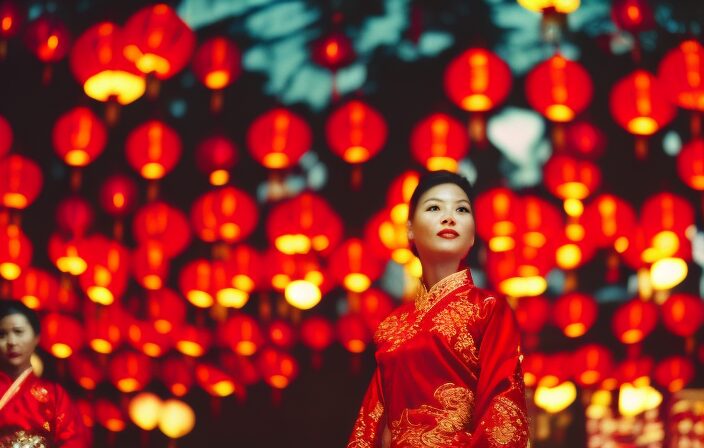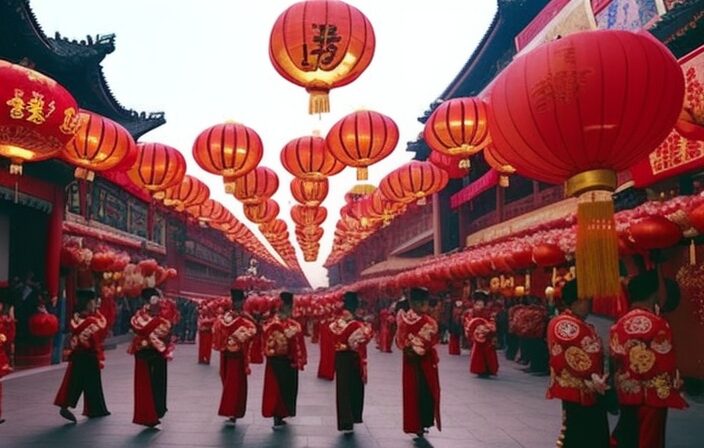Did you know that during Lunar New Year, there are various taboos and superstitions that dictate what to eat, wear, clean, and even how to travel? In this article, we will explore the intriguing world of Lunar New Year taboos and superstitions.
From forbidden foods to lucky and unlucky numbers, we will delve into the traditions and beliefs that shape this auspicious celebration. Gain insight into the cultural practices and customs surrounding Lunar New Year, and discover the fascinating dos and don’ts of this festive occasion.
Key Takeaways
- Porridge is considered taboo as it symbolizes poverty.
- Number 4 is considered unlucky as it sounds similar to the word for death.
- Traveling on the first day of the lunar new year may bring bad luck throughout the year.
- Wearing black or white clothes during the lunar new year may bring negative energy and bad luck.
Taboo Foods During Lunar New Year
Certain foods are considered taboo during the Lunar New Year due to traditional beliefs and superstitions. These taboos are followed in many Asian cultures as a way to bring good luck and avoid any potential misfortune in the coming year. One of the main taboos during this festive period is avoiding ‘unlucky’ foods. These foods are believed to bring bad luck or have negative connotations associated with them.
One example of a taboo food during the Lunar New Year is porridge. Porridge, often seen as a humble and simple dish, is considered taboo because it symbolizes poverty and lack of abundance. Instead, people opt for more auspicious and lucky foods, such as fish and dumplings. Fish is a popular dish during this time because its name, ‘yu,’ sounds like the word for surplus or abundance in Chinese. Eating fish is believed to bring prosperity and wealth for the coming year. Dumplings, on the other hand, are shaped like ancient Chinese gold or silver ingots and are associated with wealth and fortune.
Other traditional dishes that are considered lucky and commonly consumed during the Lunar New Year include spring rolls, which symbolize wealth and prosperity, and sweet rice balls, which signify family togetherness and unity. It is important to note that these taboos and beliefs vary across different regions and cultures, but they all serve as a way to ensure a prosperous and fortunate start to the Lunar New Year.
Clothing Superstitions for Lunar New Year
Wearing red or bright-colored clothing is considered auspicious and believed to bring good luck during this important cultural celebration. Lunar New Year, also known as Chinese New Year, is a time when people in many Asian countries celebrate the beginning of a new lunar calendar. Traditional clothing plays a significant role in the festivities, with specific colors and styles believed to attract prosperity and ward off bad luck.
Here are some lucky colors for Lunar New Year and the meaning behind them:
-
Red: Red is the most auspicious color during this time as it symbolizes good fortune, happiness, and warding off evil spirits. It is often worn from head to toe, including accessories like belts and shoes.
-
Gold: Gold represents wealth and prosperity. It is commonly used in traditional clothing designs and accessories to enhance the festive atmosphere.
-
Bright colors: Other bright colors such as yellow, orange, and pink are also considered lucky and are believed to bring joy and positive energy.
Traditional clothing for Lunar New Year varies across different Asian cultures. In China, the traditional outfit is the cheongsam for women and the tangzhuang for men. These garments are often adorned with intricate embroidery and patterns, showcasing the rich cultural heritage of the region.
Overall, wearing red or bright-colored clothing and traditional outfits during Lunar New Year is seen as a way to attract good luck and blessings for the year ahead.
Lunar New Year Cleaning Taboos
During this important cultural celebration, it is believed that certain cleaning activities should be avoided in order to avoid bad luck. Lunar New Year cleaning rituals hold a significant place in the festivities, as they are believed to sweep away the old and welcome fresh luck and prosperity for the upcoming year. However, there are some cleaning taboos that people observe during this time.
One of the main taboos is sweeping or cleaning the house on New Year’s Day itself. This is because it is believed that by doing so, you may sweep away all the good luck that has just entered your home. Instead, it is advised to clean the house thoroughly before the New Year’s Eve, ensuring that all the dirt and negative energy is cleared away before the start of the lunar new year.
Another cleaning taboo is using sharp objects such as knives or scissors during the lunar new year period. It is believed that using sharp objects can cut away the good luck and fortune that the new year brings. Therefore, it is recommended to avoid any cutting or sharp activities during this time.
Lucky and Unlucky Numbers in Lunar New Year
In Lunar New Year celebrations, numbers hold great significance and are believed to bring luck or misfortune. Lucky numbers are often associated with positive meanings or prosperity, while unlucky numbers are avoided due to their negative connotations.
Understanding the symbolism of lucky numbers and being aware of unlucky numbers can help individuals navigate the Lunar New Year festivities and ensure a prosperous start to the year.
Lucky Number Symbolism
Number symbolism plays a significant role in the Lunar New Year celebrations. Certain numbers are believed to bring good luck and prosperity. Here are some lucky number meanings and the significance of unlucky numbers associated with the Lunar New Year:
-
Lucky Numbers:
- Number 8: Considered the luckiest number in Chinese culture, it symbolizes wealth and prosperity.
- Number 9: Represents longevity and eternity, making it a favorable number during the Lunar New Year.
- Number 6: Associated with smoothness and success, it is believed to bring good fortune in business and career endeavors.
-
Unlucky Numbers:
- Number 4: Considered unlucky because it sounds similar to the word for death in Chinese, it is best to avoid this number during the Lunar New Year celebrations.
- Number 7: Associated with loneliness and separation, it is considered unlucky during this festive period.
Understanding the symbolic meanings of numbers can help individuals make wise choices during the Lunar New Year celebrations and enhance their chances of attracting good luck and prosperity.
Unlucky Numbers to Avoid?
It is advisable to steer clear of the number 4 during the festivities as it is considered unlucky due to its resemblance to the word for death in Chinese culture. In Chinese, the pronunciation of the number four, ‘si,’ sounds similar to the word for death, which is why it is deemed unlucky.
This belief is deeply ingrained in Chinese culture and has influenced various aspects of daily life, including the omission of the number four in floor numbers and the avoidance of gifts containing four items.
In contrast, the number eight is considered very lucky, as it sounds similar to the word for wealth and prosperity.
Additionally, red is considered an auspicious color during the Lunar New Year, while black and white are traditionally associated with mourning.
The significance of zodiac animals is also prominent during the festivities, with each animal representing different traits and characteristics believed to influence the year ahead.
Superstitions Surrounding Lunar New Year Decorations
Lunar New Year decorations are believed to hold significant superstitions and cultural symbolism. These decorations play an important role in celebrating the Lunar New Year and are thought to bring good luck and ward off evil spirits. Here are three key superstitions and cultural practices related to Lunar New Year decorations:
-
Fireworks Traditions: Fireworks have long been associated with Lunar New Year celebrations. They are believed to scare away evil spirits and bring good fortune for the coming year. In many Asian countries, fireworks displays are a major part of the festivities, with colorful explosions lighting up the night sky.
-
Red Envelopes: Red envelopes, also known as ‘hongbao’ or ‘lai see,’ are a common Lunar New Year tradition. These envelopes are filled with money and given to children, unmarried adults, and employees as a symbol of good luck and blessings for the new year. The color red is believed to ward off evil spirits and bring good fortune.
-
Symbolism in Decorations: Lunar New Year decorations such as lanterns, couplets, and paper cuttings often feature auspicious symbols and characters. For example, the Chinese character ‘福’ (fu), meaning ‘good fortune’ or ‘happiness,’ is commonly displayed upside down to symbolize the arrival of good luck. Other popular symbols include dragons, fish, and peonies, which are associated with prosperity, abundance, and good fortune.
Lunar New Year Gift Giving Etiquette
Lunar New Year, also known as Chinese New Year, is a time of joyous celebration and traditions. One important aspect of this festival is the exchange of gifts, which carries great cultural significance. Lunar New Year gift giving etiquette is rooted in ancient customs and beliefs, and understanding these traditions is essential to ensure proper respect and appreciation.
When it comes to choosing Lunar New Year gifts, there are several ideas that hold symbolic meanings. Traditional gifts include items like red envelopes filled with money, which symbolize good luck and prosperity. Other popular gift ideas include oranges, which represent wealth and good fortune, and tangerines, which symbolize luck and happiness. Additionally, gift baskets filled with dried fruits, nuts, and candies are commonly exchanged during this festive time.
The cultural significance of Lunar New Year gifts lies in the intention behind the gesture. The act of giving gifts during this time is believed to bring blessings and good luck to both the giver and the recipient. It is a way of expressing gratitude, respect, and well wishes for the coming year.
Lunar New Year Travel Taboos and Superstitions
During Lunar New Year, there are several travel taboos and superstitions that people follow to ensure a smooth and auspicious journey.
These taboos include avoiding traveling on the first day of the new year, refraining from sweeping or cleaning the house on the day of departure, and not wearing black or white clothes while traveling.
Superstitions also play a role, such as carrying lucky charms or praying for a safe journey before leaving.
Travel Taboos Explained
One interesting aspect of the lunar new year celebrations is the explanation of travel taboos. These taboos are believed to bring bad luck or hinder one’s journey during the festive season. Here are three common travel taboos explained:
-
Avoid traveling on the first day of the lunar new year: It is believed that traveling on this day may lead to bad luck throughout the year. People prefer to stay at home and spend time with their families instead.
-
Don’t sweep or clean the house on the first day: Cleaning is seen as removing good luck from the home. Therefore, it is advised to complete all cleaning tasks before the lunar new year begins.
-
Avoid wearing black or white clothes while traveling: Black and white are traditionally associated with mourning and funerals. Wearing these colors during the lunar new year may bring negative energy and bad luck.
These travel taboos are deeply rooted in Chinese culture and are followed by many during the festive season to ensure a prosperous and lucky year ahead.
Superstitions and Travel
Superstitions surrounding travel have existed for centuries and continue to influence people’s behavior when they relocate or embark on a journey. Relocation superstitions vary across cultures, with some believing that moving on a certain day or time can bring good or bad luck. For instance, in Chinese culture, it is considered unlucky to move during the Ghost Month, as spirits are said to roam freely during this time.
Travel taboos in different cultures also play a significant role in shaping people’s travel experiences. In Japan, it is believed that cutting your nails at night brings bad luck, while in Russia, it is considered unlucky to shake hands or give flowers across a doorway. These taboos serve as a way for individuals to navigate unfamiliar environments and show respect for local customs and beliefs.
Understanding superstitions and travel taboos in different cultures can help travelers adapt to their surroundings and avoid offending local customs. By respecting these beliefs, travelers can enhance their experiences and foster positive interactions with locals.
What Are Some Taboos and Superstitions Associated with Lunar New Year Family Reunions?
The importance of lunar new year family reunions is marked by several taboos and superstitions. Avoid sweeping the floor during the first few days, as it might symbolize sweeping away good luck. Breaking dishes is seen as bad luck, so be careful around fragile items. Additionally, wearing black or white is discouraged, as they are considered mourning colors.
Conclusion
In conclusion, the Lunar New Year is not only a time for celebration but also a time for observing various taboos and superstitions.
From avoiding certain foods to wearing specific clothing, cleaning rituals, and even choosing lucky numbers, these customs are deeply ingrained in the culture.
Furthermore, the superstitions surrounding decorations and gift-giving etiquette add to the richness and complexity of this festive occasion.
By understanding and respecting these traditions, we can fully embrace the spirit of the Lunar New Year.



